dPHE 2nd Anniversary Celebration and Professor Patty Kostkova’s Inauguration Event
26 January 2021, 3:00 pm–5:00 pm
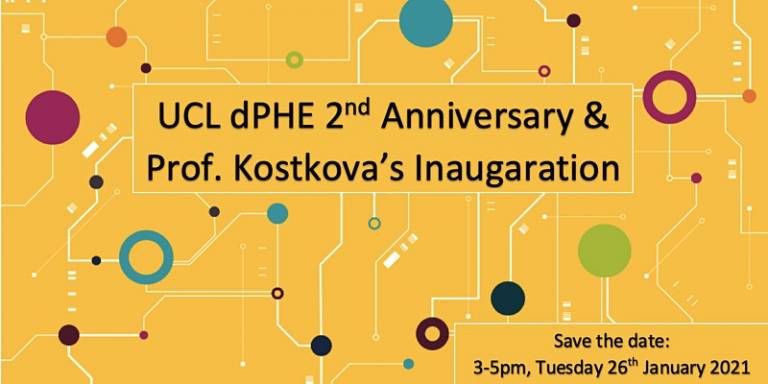
The award-winning 'Team of the Year', the UCL Centre for Digital Public Health in Emergencies, is celebrating its second anniversary with an online event featuring project highlights and the professorial inauguration of Professor Patty Kostkova.
This event is free.
Event Information
Open to
- All
Availability
- Yes
Cost
- Free
Organiser
-
Phil Baker – UCL IRDR Centre for Digital Public Health in Emergencies
This two-hour conference brings together two years of digital public health in emergencies at UCL Centre for dPHE. The event will feature guest speakers, highlights from the Centre's global-impact projects, a selection of digital health specialised panelists and the inaugaration of the Centre's director, Professor Patty Kostkova.
Event programme
The event programme will be confirmed nearer to the date, but will include guest speakers, a panel discussions, a highlights presentation and an opportunity for networking.
Speakers
- Vice Provost (Health): Professor David Lomas
- David is Vice Provost (Health), Head of UCL School of Life and Medical Sciences, Head of UCL Medical School and Director of the UCL Partners AHSC since 2015. He previously chaired the Respiratory Therapy Area Unit Board at GlaxoSmithKline and was Deputy CEO of the Medical Research Council (UK). David is a NED at Royal Free London, University College London Hospitals, the Francis Crick Institute, the Africa Health Research Institute, the British Heart Foundation, MedCity Ltd. and the Academy of Medical Sciences. He is an NIHR Senior Investigator. David’s research has focused on α1-antitrypsin deficiency, the serpinopathies and COPD.
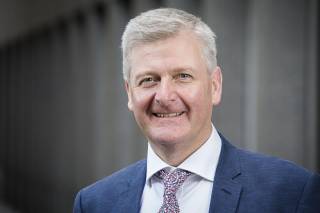
- IRDR Director: Professor Peter Sammonds
- Peter is Director of the UCL Institute for Risk and Disaster Reduction and Professor of Geophysics. He works at the interface of natural and social sciences. His research and knowledge exchange is on natural hazard risks, disasters and recovery and he has worked on earthquake mechanics, volcanoes and ice physics in the Arctic. He works on research council, British Academy and Royal Society-funded projects on Increasing Resilience to Environmental Hazards in Border Conflict Zones and Resilience Futures for the Rohingya Refugees. He has advised the UK research councils on the increasing resilience to natural hazards programme; been a member of EEFIT Earthquake Engineering Field Investigation teams, contributing to inter-disciplinary reports on disaster, taken up widely by government for policy advice; and been a Commissioner on the UCL–Lancet Commission on Migration and Health, 2017–18, whose report has been influential. He is currently the Gender and Intersectionality Ambassador for the UKRI network+ Gender Responsive Resilience & Intersectionality in Policy and Practice (GRRIPP) project led by the IRDR Centre for Gender and Disaster.
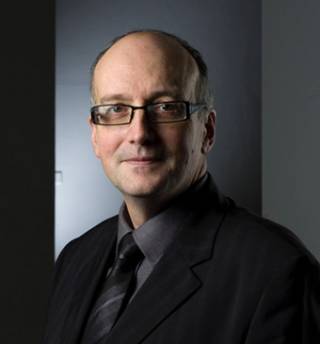
- UCL dPHE Director: Professor Patty Kostkova
- Patty is Professor in Digital Health and the Director of UCL Centre for Digital Public Health in Emergencies (UCL dPHE). Prior to joining UCL, Patty was appointed ISI Foundation Fellow and was a consultant at WHO, ECDC, Telefonica, Sky and Foundation Merieux. In 2019 and 2020, for two years in a row, Patty won the 'Innovator of the Year' Award, in 2017 was shortlisted for the Woman of the Year, in 2018 was shortlisted for the Team Leader of the Year and in 2020 Digital Leader of the Year by Computing Women in IT Excellent Awards. Her research was also awarded the EHI 2012 Prize – finalist in Category “Best Use of social media in healthcare” and BCS and Computing: UK IT Industry Awards 2012 – finalist in Category, IT project demonstrating most effective use of collaborative technology'. The GADSA project won Highly Commended Award in the prestigious UK IT Awards – category Healthcare Project of the Year 2020. Since 2014, she is the Editor in chief of the Frontiers in Digital Public Health. Patty is also the General and Scientific Chair of the International Digital Public Health Conference series since 2009 (www.acm-digitalhealth.org). Her research was extensively covered by international media including the Medi1TV, BBC, AFP, the Vancouver Sun, the Malaysian Insider. For her research into COVID-19, she received a wide coverage in media and the prestigious ‘Coronapersona’ profile at Science Business.
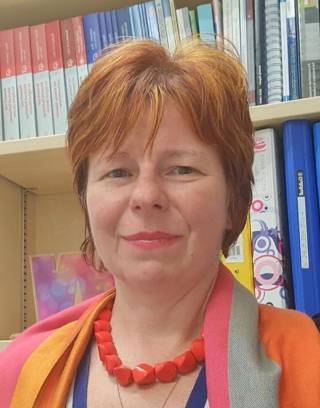
- Panel Chair: Professor Ijeoma Uchegbu
- Ijeoma Uchegbu is UCL’s Professor of Pharmaceutical Nanoscience and Chief Scientific Officer of Nanomerics Ltd, a UCL spin out company. She was the first to show that peptides could be delivered across the blood brain barrier to elicit a pharmacological response, leading to the enkephalin pain medicine candidate (NES100), designed to address the opioid crisis. The technology underpinning NES100 won first prize in the Royal Society of Chemistry’s Emerging Technologies competition in 2017 and the Academy of Pharmaceutical Sciences Science Innovation Award in 2016. Uchegbu’s work has been funded continuously for 21 years by the EPSRC and she serves on the BBSRC Council. As UCL’s Pro Vice Provost for Africa and the Middle East, Uchegbu leads on the international research and teaching engagement strategy in this region. She has served as Chair of the Academy of Pharmaceutical Sciences and chaired EPSRC and Science Foundation Ireland grant prioritisation panels. She is UCL Provost’s Envoy for Race Equality and leads on race equality work at UCL. Her initiatives (e.g. Dean’s Pledges on Race Equality) were instrumental in achieving UCL’s Bronze Race Charter in 2020.
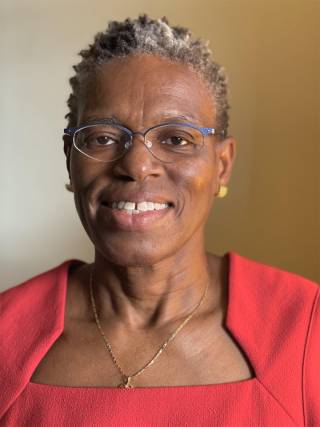
- Vice Provost (Research): Professor David Price
- David is Vice-Provost (Research) at UCL and Professor of Mineral Physics. David has an undergraduate degree and a PhD from the University of Cambridge. He was one of the first to establish the now major interdisciplinary field of 'computational mineral physics'. He was awarded the Schlumberger Medal of the Mineralogical Society of Great Britain in 1999; the Murchison Medal of the Geological Society of London in 2002; and in 2006 he was awarded the Louis Néel Medal of the European Geosciences Union. He is a Member of the Academia Europaea, Fellow of the Geological Society of London, and an Elected Fellow of the American Geophysical Union and of the Mineralogical Society of America. He is chair of the Vice-Rectors of Research Committee of the League of European Research Universities, and is the current Chair of Panel B for REF2021, having been a member of the RAE2008 sub-panel on Earth and Environmental Sciences, chair of the REF2014 sub-Panel in this area.

Additional speakers will be added as they are confirmed.
About the dPHE in 2020
The dPHE has had a number of recent award nominations in 2020, including: ‘Highly Commended’ at the UK IT Industry Awards for the 'Healthcare Project of the Year', ‘Innovator of the Year’ for Prof. Patty Kostkova by the Women in Tech Excellence Awards for the second year running, and ‘Team of the Year’ at the Computing ‘Rising Star’ awards, reflecting how the team has risen to the COVID-19 challenge.
Since the beginning of the COVID-19 crises, the team set up to help fight the pandemics through technology.
The dPHE set up three new COVID-19 IT digital initiatives. They rapidly launched a new digital health app My Lockdown Journal app, supporting citizens in the lockdown, informed by the multi-part, 5000+ participant survey running since early April 2020. The pilot app was launched in June 2020 and received wide media coverage including Mail Online and iNews.
Since February 2020, they have also been running a study analysing Twitter discourse to understand changing public attitudes towards government policies in multiple languages in collaboration with the World Health Organization and Universitat Pompeu Fabra Barcelona.
UCL dPHE has also worked extensively on COVID-19 in Brazil. By leveraging long-term research partnerships investigating the Zika virus, the consortium developed a machine learning prediction model and deployed thermal drones to assess mass gatherings to enable early warning for the authorities in Northeast Brazil.
Save the date, follow the dPHE on Twitter or Instagram at: UCL_dPHE and get involved in their current COVID-19 projects via social media. You can also email them with queries at irdr.dphe@ucl.ac.uk
 Close
Close

